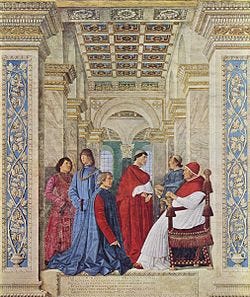“When I think of literature, I am reminded of what the great Argentinean writer Jorge Luis Borges used to tell his students, namely that the most important thing is simply to read, to enter into direct contact with literature, to immerse oneself in the living text in front of us, rather than to fixate on ideas and critical comments.”—Pope Francis
The “Role of Literature” was the topic of a Papal Letter issued July 19, 2024.1 It was issued in Arabic, German, English, French, Italian, Polish and Portugues.2 The original in multiple languages includes linked footnotes.
Excerpts from LETTER OF HIS HOLINESS POPE FRANCIS
ON THE ROLE OF LITERATURE IN FORMATION
“literature… originates in the most irreducible core of the person, that mysterious level of their being… Literature is life, conscious of itself, that reaches its full self-expression through the use of all the conceptual resources of language”.
Literature thus has to do, in one way or another, with our deepest desires in this life, for on a profound level literature engages our concrete existence, with its innate tensions, desires and meaningful experiences.
How can we reach the core of cultures ancient and new if we are unfamiliar with, disregard or dismiss their symbols, messages, artistic expressions and the stories with which they have captured and evoked their loftiest ideals and aspirations, as well as their deepest sufferings, fears and passions? How can we speak to the hearts of men and women if we ignore, set aside or fail to appreciate the “stories” by which they sought to express and lay bare the drama of their lived experience in novels and poems?
We need to rediscover ways of relating to reality that are more welcoming, not merely strategic and aimed purely at results, ways that allow us to experience the infinite grandeur of being. A sense of perspective, leisure and freedom are the marks of an approach to reality that finds in literature a privileged, albeit not exclusive, form of expression. Literature thus teaches us how to look and see, to discern and explore the reality of individuals and situations as a mystery charged with a surplus of meaning that can only be partially understood through categories, explanatory schemes, linear dynamics of causes and effects, means and ends.
In terms of the use of language, reading a literary text places us in the position of “seeing through the eyes of others”, thus gaining a breadth of perspective that broadens our humanity. We develop an imaginative empathy that enables us to identify with how others see, experience and respond to reality. Without such empathy, there can be no solidarity, sharing, compassion, mercy. In reading we discover that our feelings are not simply our own, they are universal, and so even the most destitute person does not feel alone.
Can the pope save the humanities?
An article in the Chronicle of Higher Education on August 12, 2024, asked if the Pope could save the humanities?3 The author, Len Gutkin, observes: “I have sometimes wondered whether religious colleges will become repositories for areas of humanistic study in terminal decline across the broader educational landscape. If so, the pope’s letter on literature offers some theoretical justifications.”
The Pope has a very big library
The Papal letter includes linked footnotes. The Pope has a very big library.4 Since September 2022 Angelo Vincenzo Zani has been the archivist and librarian of the Holy Roman Church. (Bibliothecarius XLIX).5
LETTER OF HIS HOLINESS POPE FRANCIS ON THE ROLE OF LITERATURE IN FORMATION- Given in Rome, at Saint John Lateran, on 17 July in the year 2024, the twelfth of my Pontificate.- FRANCIS
English; سالة قداسة البابا فرنسيسفي دور الآداب في التّنشئة ; BRIEF DES HEILIGEN VATERS FRANZISKUS
ÜBER DIE BEDEUTUNG DER LITERATUR IN DER BILDUNG; CARTA DEL SANTO PADRE FRANCISCO SOBRE EL PAPEL DE LA LITERATURA EN LA FORMACIÓN; LETTRE DU PAPE FRANÇOIS SUR LE RÔLE DE LA LITTÉRATURE DANS LA ; LETTERA DEL SANTO PADRE FRANCESCO SUL RUOLO DELLA LETTERATURA NELLA FORMAZIONE; List Ojca Świętego Franciszka o roli literatury w formacji ; CARTA DO SANTO PADRE FRANCISCO SOBRE O PAPEL DA LITERATURA NA EDUCAÇÃO
Gutkin, Len. Can the pope save the humanities? Review, Chronicle of Higher Education, August 12, 2024.
Piazzoni, Ambrogio M. 2012. The Vatican Library. Citta del Vaticano, Milano: Musei Vaticani : Libreria Editrice Vaticana ; Jaca Book.
"Rinunce e nomine, 26.09.2022" (Press release) (in Italian). Holy See Press Office. 26 September 2022. Retrieved 26 September 2022.







I have to have a book. One funny thing is that, over the last couple of years, I have read most of the work of Rex Stout about his brilliant overweight detective Nero Wolfe and narrating assistant Archie Goodwin. It's set in New York from the 1930s to 1970s but in thousands and thousands of words there's not a single 'eff'.